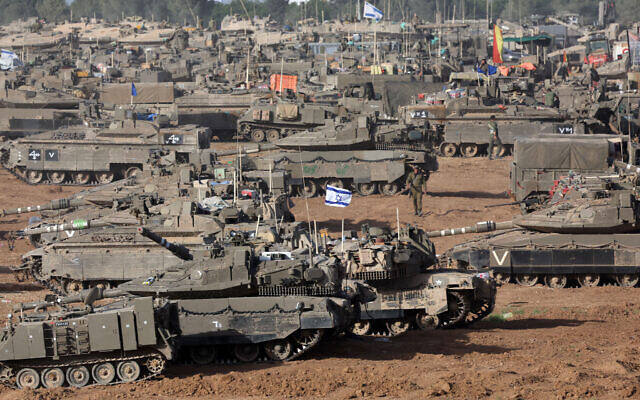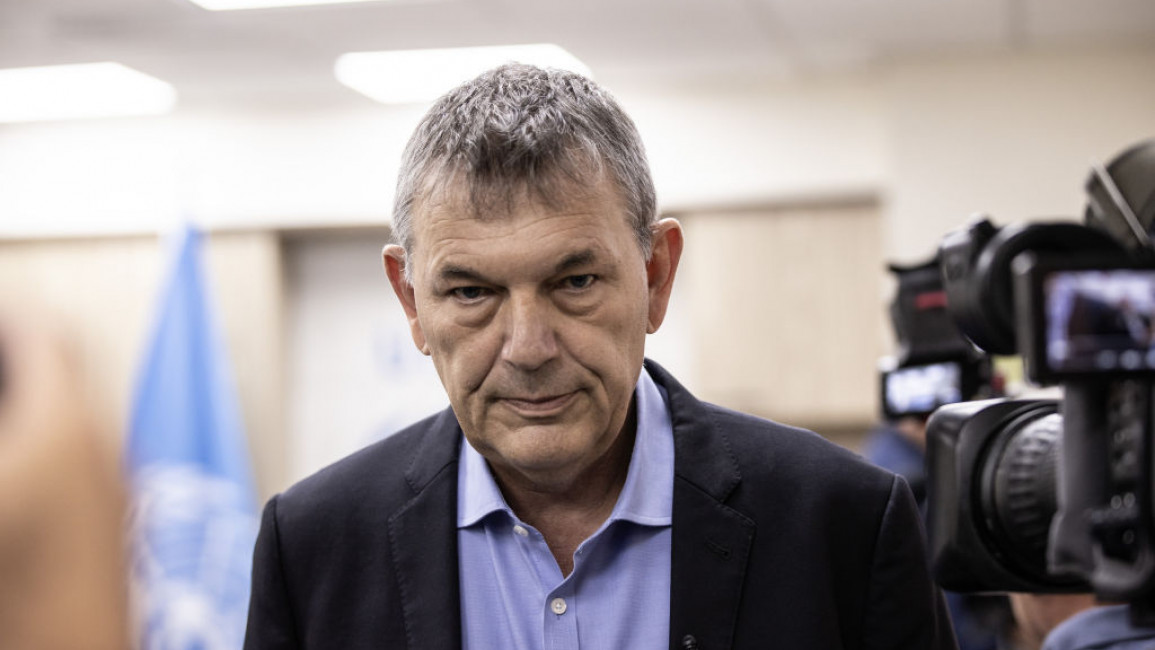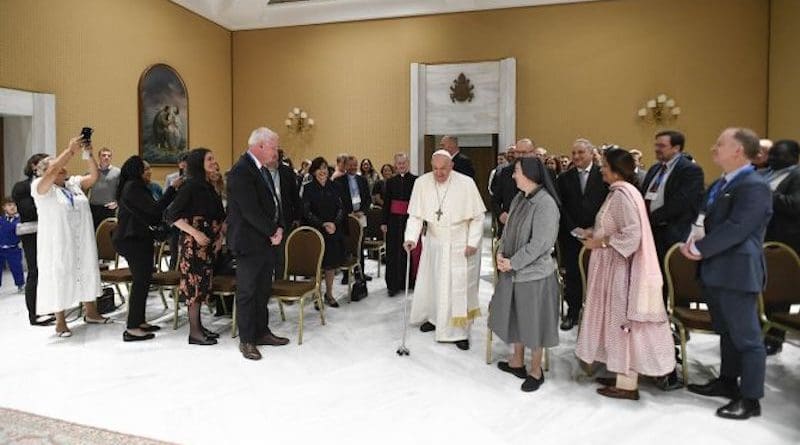Tel Aviv is slated to receive a diverse array of American military equipment, spanning from joint direct attack munitions — transforming conventional bombs into precision tools — to tank rounds, mortars, and armoured tactical vehicles.

A view of M825 and M825A1 artillery shells labeled D528, the US Department of Defense Identification Code for “white phosphorus-based munitions” in Sderot, Israel on October 09, 2023. [Mostafa Alkharouf /Anadolu Agency]
Billions of dollars worth of US weaponry remains in the pipeline for Israel, despite the delay of one shipment of bombs and a review of others by President Joe Biden's administration, concerned their use in an assault could wreak more devastation on Palestinian civilians.
A senior US official said this week that the administration had reviewed the delivery of weapons that Israel might use for a major invasion of Rafah, a southern Gaza city where over 1.5 million civilians have sought refuge, and as a result paused a shipment of bombs to Israel.
Washington has long urged Prime Minister Benjamin Netanyahu's far-right government not to invade Rafah without safeguards for civilians, seven months into a war that has devastated much of Gaza.
Congressional aides estimated the delayed bomb shipment's value as "tens of millions" of US dollars. The shipment was supposed to consist of 1,800 2,000-pound (900-kilogramme) bombs and 1,700 500-pound (225-kilogramme) bombs, according to a senior US administration official who spoke on the condition of anonymity to discuss the sensitive matter.
A wide range of other military equipment is due to go to Israel, including joint direct attack munitions (JDAMS), which convert dumb bombs into precision weapons; and tank rounds, mortars and armoured tactical vehicles, Senator Jim Risch, the top Republican on the Senate Foreign Relations Committee, told reporters.
Risch said those munitions were not moving through the approval process as quickly as they should be, noting some had been in the works since December, while assistance for Israel more typically sails through the review process within weeks.
Biden administration officials have said they are reviewing additional arms sales, and Biden warned Israel in a CNN interview on Wednesday that the US would stop supplying weapons if Israeli forces make a major invasion of Rafah.
Israeli bombardment in Gaza has killed some 34,904 Palestinians, wounding 78,514 and uprooted the majority of Gaza's 2.4 million people.
Separately, Representative Gregory Meeks, top Democrat on the House of Representatives Foreign Affairs Committee, has put a hold on an $18 billion arms transfer of package for Israel that would include dozens of Boeing Co. F-15 aircraft. At the same time, he awaits more information about how Israel would use them.
Biden's support for Israel in its war against Gaza has emerged as a political liability for the president, particularly among young Democrats, as he runs for re-election this year. It fuelled a wave of "uncommitted" protest votes in primaries and has driven pro-Palestine protests at US universities.
None of those weapons agreements are part of a spending package Biden signed last month that included about $26 billion to support Israel and provide humanitarian aid.
Risch and Meeks are two of the four US lawmakers — the chair and ranking member of Senate Foreign Relations and chair and ranking member on House Foreign Affairs — who review major foreign weapons deals.
'Fight with their fingernails'
Ignoring Biden's warning, hawkish Netanyahu issued a video statement on Thursday saying Israelis "would fight with their fingernails" in an apparent rebuff of Biden.
Republicans accused Biden of backing down on his commitments to Israel. "If the Commander-in-Chief can't muster the political courage to stand up to radicals on his left flank and stand up for an ally at war, the consequences will be grave," Senate Republican leader Mitch McConnell said in a Senate speech.
Ten other Senate Republicans held a press conference to announce a non-binding resolution condemning "any action by the Biden Administration to withhold or restrict weapons for Israel."
White House National Security spokesperson John Kirby told reporters Israel was still getting the weapons it needs to defend itself. "He's (Biden's) going to continue to provide Israel with the capabilities that it needs, all of them," Kirby said.
Some Congressional Democrats welcomed Biden's action.
Senator Chris Murphy, the Democratic chair of the Foreign Relations Mideast subcommittee, cited concern about Rafah.
"I do not think it is our strategic or moral interest to help Israel conduct a campaign in Rafah that is likely to kill thousands of innocent civilians and not likely impact Hamas' long-term strength in a meaningful way," he told Reuters.
The US declared its support for Israel since the beginning of the war on October 7 last year. US never holds back in arming Israel, regardless of alarming Gaza civilian casualties.
The United States gives Israel $3.8 billion in annual military dole and often shields its ally at the United Nations.
Gen. Wesley Clark to Newsmax: Doubt Israel Needs Weapons From US
By Mark Swanson | Thursday, 09 May 2024
Retired Gen. Wesley Clark told Newsmax on Thursday it's his belief that Israel has shrugged off President Joe Biden's hold on certain munitions, saying he would be "surprised if Israel needs anything from us."
Clark joined "The Record With Greta Van Susteren" to discuss Biden's holding back of munitions as a warning to Israel not to invade Rafah.
"Israel has adequate military means. I think the United States knows that. And Israel is going to do what Israel needs to do, and I think it should do that," Clark said.
"I'd be very surprised if Israel needs anything from us, actually," Clark said, regarding its incursion into Rafah. "I got a great deal of respect for the Israeli armed forces. I don't think they've exhausted their stockpiles. I don't think they're waiting for just-in-time arrival, on anything from rifles to tanks to spare parts or whatever that they need for Gaza.
"But I think they always feel more secure if they have a larger inventory. I think these shipments that have been stopped probably will result in some rundown of those inventories," he added.
Despite Biden’s pause, billions of dollars in US arms for Israel still in pipeline
GOP senator says wide range of other munitions set to go to Israel besides withheld bombs, but laments approval process for them not as quick as it should be

Illustrative - IDF tanks are positioned in southern Israel near the border with the Gaza Strip on May 9, 2024. (Ahmad Gharabli/AFP)
Billions of dollars worth of US weaponry remains in the pipeline for Israel, despite the delay of one shipment of bombs and a review of others by US President Joe Biden’s administration, which says it’s concerned the Israel Defense Forces could use them in densely populated Rafah, as is has in other parts of Gaza.
A senior US official said this week that the administration had reviewed the delivery of weapons that Israel might use for a major invasion of Rafah, a southern Gaza city where over one million civilians have sought refuge, and as a result paused a shipment of 2,000- and 500-pound bombs to Israel.
Washington has long urged Prime Minister Benjamin Netanyahu’s government not to invade Rafah without safeguards for civilians, seven months after Hamas’s October 7 massacre in southern Israel started the war in Gaza.
The issue has become a major point of contention between Biden and Netanyahu, who insists a ground offensive into Rafah is necessary to fulfill the war goal of removing Hamas from power following the October 7 massacre. Netanyahu’s hard-right coalition partners have demanded that the offensive go ahead, threatening to bolt the government should it instead prioritize a truce agreement freeing hostages and halting the fighting.
Congressional aides estimated the delayed bomb shipment’s value as “tens of millions” of US dollars.
A wide range of other military equipment is due to go to Israel, including joint direct attack munitions (JDAMS), which convert dumb bombs into precision weapons; and tank rounds, mortars and armored tactical vehicles, Senator Jim Risch, the top Republican on the Senate Foreign Relations Committee, told reporters.

File – Republican Sen. Jim Risch speaks to media about Israel, October 18, 2023, on Capitol Hill in Washington. (AP Photo/Stephanie Scarbrough)
Risch said those munitions were not moving through the approval process as quickly as they should be, noting some had been in the works since December, while assistance for Israel more typically sails through the review process within weeks.
Biden administration officials have said they are reviewing additional arms sales, and Biden warned Israel in a CNN interview on Wednesday that the US would stop supplying weapons if Israeli forces make a major invasion of Rafah.
The war in Gaza was triggered by Hamas’s October 7 massacre, which saw some 3,000 terrorists burst across the border into Israel by land, air and sea, killing some 1,200 people and seizing 252 hostages, mostly civilians, many amid acts of brutality and sexual assault.
The subsequent Israeli offensive, aimed at destroying Hamas and freeing the hostages, has killed some 35,000 Palestinians, according to the Hamas-run health ministry. The figure cannot be independently verified, and is believed to include both civilians and combatants killed in Gaza, including as a consequence of terror groups’ own rocket misfires.

Smoke billows from Israeli strikes on eastern Rafah in the southern Gaza Strip on May 7, 2024. (AFP)
The IDF says it has killed over 13,000 operatives in Gaza, in addition to some 1,000 terrorists inside Israel on October 7. The IDF says 267 soldiers have been killed during the ground offensive against Hamas and amid operations along the Gaza border.
Separately, Representative Gregory Meeks, top Democrat on the House of Representatives Foreign Affairs Committee, is holding up an $18 billion arms transfer of package for Israel that would include dozens of Boeing Co. F-15 aircraft while he awaits more information about how Israel would use them, though the fighter jets are not slated to be delivered for several years.
“It’s enough of the indiscriminate bombing,” Meeks charged last month. “I don’t want the kinds of weapons Israel has to be utilized to have more death. I want to make sure humanitarian aid gets in, and I don’t want people starving to death.”
Biden’s support for Israel in its war against Hamas has emerged as a political liability for the president, particularly among young Democrats, as he runs for re-election this year. It fueled a wave of “uncommitted” protest votes in Democratic primaries and has driven anti-Israel protests at US universities, though a recent poll showed over 70 percent of Americans overall believe Israel should launch an offensive in Rafah to defeat Hamas.
None of those weapons agreements are part of a spending package Biden signed last month that included about $26 billion to support Israel and provide humanitarian aid.
Risch and Meeks are two of the four US lawmakers – the chair and ranking member of Senate Foreign Relations and chair and ranking member on House Foreign Affairs – who review major foreign weapons deals.














